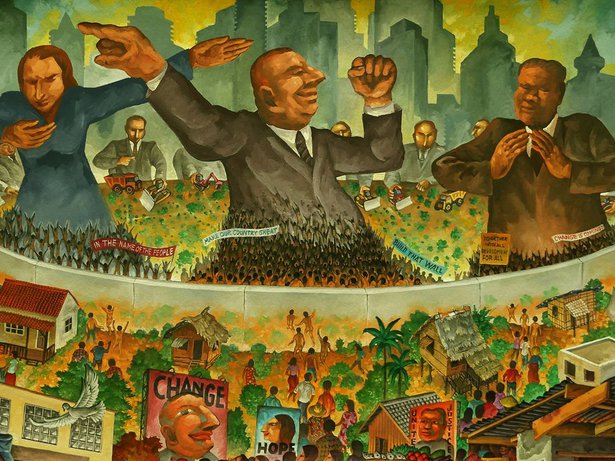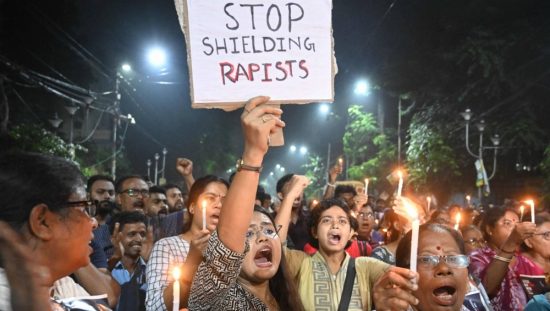There’s no denying that the tendrils of authoritarian populism have been slowly strengthening their grip on the political institutions of democratic countries all over the world. Freedom House’s 2021 “Freedom in the World” report documented a sharp acceleration in the global decline of democracy since 2020, and found that the share of countries identified as ‘Not Free’ reached its highest level since 2006. Whether it’s individual political actors such as Javier Milei in Argentina, Giorgia Meloni in Italy, or entire political parties, such as the Sweden Democrats, authoritarian ideologies appear to be experiencing increasing popularity on a global scale.
Global right-wing populism is primarily driven by shifts in the nature of contemporary capitalism, and in particular by the ascendancy of neoliberal policies and backlash against progressive cultural shifts. These factors enable political leaders to take advantage of the resentment and anger people feel towards their political institutions, creating opportunities to seize power for themselves and their party.
Decades of unregulated capitalism and failures of globalization have severely impacted global workforces. Economic globalization and neoliberal policies have led to widening income inequality, declining living standards for lower and working class populations, and the erosion of welfare safety nets. These economic grievances create fertile ground for populist leaders to sow seeds of discontent with the establishment and make specious promises to prioritize ordinary citizens over global institutions and elites, evidenced by the increasing vote share for populists coming from economically marginalized communities. Another explanation for the surge of authoritarian populism, specifically in the West, is the cultural backlash theory, which holds that growing acceptance of socially progressive stances has prompted an intense reaction among more traditional populations, who feel threatened and aggrieved. By examining how economic inequality and cultural backlash have impacted the aforementioned countries, we can better understand the mechanisms by which democratic institutions are subverted, paving the way for the pernicious rise of authoritarian populism.
Javier Milei, Argentina’s president elected in December 2023, is a former TV celebrity and far-right populist who skyrocketed to popularity through his radical claims and attention-grabbing antics. As a self-described “anarcho-capitalist,” Milei primarily campaigned on eliminating government health and education ministries and replacing the Argentinian peso with the US dollar. He also campaigned on social issues, using inflammatory rhetoric to attack reproductive rights and feminist movements and denying the existence of climate change.
Milei was able to capitalize on Argentina’s chronic inflation, economic instability, and political corruption, proposing radical economic stances and using anti-establishment rhetoric. His anti-government stance resonated with many Argentinians who felt alienated by traditional policies and institutions, and were angry at the government’s failure to put the country on a viable path to economic development. In the 2010s, Argentina saw a surge of feminist activism and mobilization, and over the past fifteen years there has been an increase in progressive legislation, including the legalization of abortion in 2020, that has led to significant expansion of LGBTQ+ and women’s rights. Throughout Milei’s campaign, he spoke of declaring war on feminism, political correctness, and “cultural Marxism”.
In Italy, support for Prime Minister Giorgia Meloni and her party, Brothers of Italy, has been on the rise since 2019. Brothers of Italy was formed in 2012 out of neo-fascist roots, and Meloni is a longtime politician known for her radical right-wing stances on LGBTQ+ rights, immigration, and abortion. Meloni and her party have tapped into nationalist sentiments, emphasizing Italy’s sovereignty and cultural identity while advocating for stringent immigration policies and a tough stance on crime.
Similar to Milei, Meloni took advantage of public dissatisfaction with mainstream parties and their perceived failure to address pressing issues such as immigration, economic stagnation, and decline of social cohesion. Populist support is typically strengthened by anti-immigrant attitudes, mistrust of national governance, and support for authoritarian values, all of which can be found in Meloni’s political style and leadership. Meloni also employs nativist and nationalist rhetoric to justify exclusionary immigration policies, prompting comparisons between her and President Trump, who similarly vows to restore a mythical past and uses inflammatory anti-immigration rhetoric.
In Sweden, the Democrat party was founded in 1988 from an extreme right-wing background and was viewed as morally and politically illegitimate by the public. They describe themselves as social conservatives with a nationalist foundation, opposing current Swedish integration and multiculturalism and advocating for stronger restrictions on immigration. The Sweden Democrats’ ascension to power has been noted as the end of Swedish exceptionalism—the idea that Sweden stood out both materially and morally. Their increasing popularity underscores the growing discontent among segments of the Swedish population that there is a perceived erosion of traditional Swedish values and identity. The Sweden Democrats’ trajectory, again, follows the broader trend of populist authoritarianism: societal disillusionment, identity politics, and dissatisfaction with established political elites.
The parties and political actors mentioned in Argentina, Italy, and Sweden have a shared emphasis on ethno-nationalism and the belief that elites favor internationalism and cosmopolitanism over the nation and interests of the people. The United States has also been slipping towards authoritarian populism in recent years. Freedom House cites erosion of democratic institutions, rising political polarization and extremism, growing disparities in wealth and economic opportunity, and partisan pressure on the electoral process as reasons for this shift, and issued a statement urging recommitment to democratic principles after Trump won the 2024 presidential election.
Trump’s appeal has gone hand in hand with a decreasing trust in government and the rise of polarization; Milei, Meloni, Trump, the Sweden Democrat Party, and all other leaders of this kind claim to fix the perceived shortcomings of traditional governance structures and promise to bridge the gap between people and the political establishment, while actually seizing power for themselves and weakening democracy. Looking into these countries provides some specific insight into how right-wing populists gain power and exemplify the larger shift towards authoritarianism worldwide.
In the face of these challenges, strengthening democracy requires a concerted effort to address underlying economic inequalities, bridge social divides, and restore trust in democratic institutions. Reversing the damage of neoliberal economic policy will require implementation of progressive policies aimed at decreasing income inequality and expanding social safety nets. Legislation such as the Inflation Reduction Act, passed under the Biden-Harris Administration in 2022, is a step in the right direction for the US economy.
The IRA set aside $369 billion in funding for climate and clean energy provisions and is focused on reducing inflation, addressing climate change, lowering healthcare costs, and improving tax equity. From a combination of private-sector investment and government support, the bill created 114,000 clean energy jobs in 2023, and is likely to have a sustained global impact both on reducing emissions and in favoring American industry through expanded domestic manufacturing capacity. While there have been some challenges in its implementation, it is representative of a resilient and equitable path to achieving U.S. climate and economic goals.
The complex drivers of the authoritarian populist surge require equally complex solutions. Strengthening democratic institutions will require structural changes to political systems to increase the accountability of elected representatives—such as making anti-corruption reforms—to help rebuild trust in government. Reducing polarization and pushing for coalition-building between political groups is another way to strengthen democratic norms and foster community building. Key measures to mitigate polarization include policies that limit the dissemination of misleading and false information on social media and news platforms, as well as structural electoral changes. Countries can implement proportional representation or switch to ranked choice voting, which has been shown to reduce negative campaigning.
Cooperation between local and national governments will be fundamental in rebuilding democratic institutions and restoring public faith in politics. An example of community building can be seen through integration plans in Germany that provide education and job support for immigrants, building a sense of unity and national pride that is not rooted in ethnicity or nativism. Proactive measures aimed at promoting inclusivity and safeguarding democratic values can prevent the rise of authoritarian populism and preserve democracy domestically and globally.



